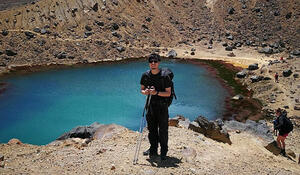
- Employer: Land Information New Zealand
- Qualification and GIS component: BSocSc (Hons) in Geography, PGDip Applied Science (GIS)
- Tertiary Institute: Hong Kong Baptist University, University of Otago
Why did you choose to study GIS?
I love problem solving and I found that GIS can help you transform the world into a giant puzzle that can be solved with computing. I thought it would be fun to pursue this as my career.
What are some of the benefits you’ve experienced from studying GIS?
I think some programming or scripting skill is quite a large benefit. I have been a data entry clerk years ago and I think manual and repetitive work is one of the most soul-destroying things in our lives. With programming you can build software and let the computers do it. I found the Spatial Analysis and Programming course I did at the University of Otago was very helpful for my work at LINZ, initially as an Intern and now as a Location Data Analyst.
Besides work, you can also do a lot of fun DIY projects with GIS - depends on your creativity.
How important is GIS for your existing and future career options, and why?
I would say it is very important for my current job as I am dealing with GIS data and software on a daily basis. Not only in New Zealand, GIS specialists are very much in demand around the world. There are plenty of future career options in GIS.
The skills in the GIS industry are transferable to many other industries as well. So even if you find you have had enough GIS one day you won’t be stuck for another job.
What advice would you give to future students considering adding a GIS component to their studies?
Same as every other subject, do it if you are interested in it. GIS is very board and different universities may have different focuses so make sure you have an idea on what you are about to study. You also need to be comfortable with using computers and getting along with the ever-changing technology.
Once you are in it, I would suggest get really good with the basics, and remember GIS is about the world and the world is dynamic, so don’t limit yourself to the textbooks. Always try new things and look for possible projects around yourself.